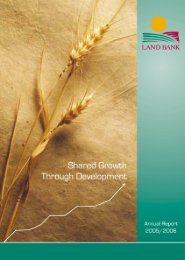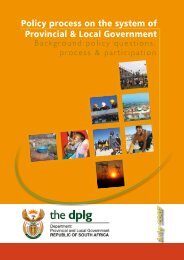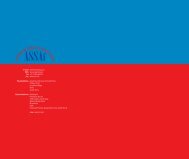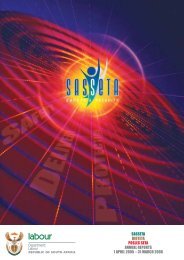Human Settlements Review - Parliamentary Monitoring Group
Human Settlements Review - Parliamentary Monitoring Group
Human Settlements Review - Parliamentary Monitoring Group
Create successful ePaper yourself
Turn your PDF publications into a flip-book with our unique Google optimized e-Paper software.
<strong>Human</strong> <strong>Settlements</strong> <strong>Review</strong>, Volume 1, Number 1, 2010<br />
healing, we do (14).<br />
As Ian McCallum (2005) argues, having turned<br />
a blind eye to the fact that we are part of nature’s<br />
great diversity, we have become ecologically<br />
unintelligent (14). We have steadily distanced<br />
ourselves from our biological past. “We have<br />
ignorantly, if not arrogantly, placed ourselves<br />
at the apex of creation. It is time to come down<br />
from that precarious pedestal” (McCallum,<br />
2005, 14) “Let’s become conscious of the<br />
animals that we have on board with us and of<br />
what they mean to us” (McCallum 2004, 229).<br />
Urban people tend to have less and less<br />
contact with nature and as a result, they<br />
may be less inclined to behave responsibly<br />
towards the environment, however unwittingly,<br />
as they become more removed from the very<br />
natural systems that underpin their survival.<br />
If sustainability and humanity’s continued<br />
survival on this planet is the project, we need<br />
to start imagining and implementing the notion<br />
of nature into those domains of the ‘civilized’,<br />
the urban and industrial centres and the way<br />
they work.<br />
The idea of human as separate from nature is a<br />
binary deeply rooted in western civilization. It is<br />
present in the Judeo-Christian traditions which<br />
describe an origin in which man was given<br />
dominion over the beasts. In ancient Greece<br />
and in the Tale of Gilgamesh, the forests were<br />
the representation of all brutishness and evil,<br />
the domain of wild irrational female forces<br />
which contrasted with the city state that was<br />
associated with rationality and maleness. In<br />
middle ages Europe, the image of an ordered<br />
world of culture managed by civilized men<br />
surrounded by a chaotic wilderness inhabited<br />
by savages, pagan warlocks and witches who<br />
drew their power form nature itself continued<br />
(Colchester 1994). An idea that continued,<br />
and still continues, to inform the activities of<br />
fundamentalist Christian missionaries, that<br />
see the practices of shamanism by indigenous<br />
peoples as “devil worship” as such, the project<br />
of taming the wilds and civilizing the savage<br />
became a fundamental truth and clear destiny<br />
(Chidester 1996, Colchester 1994). The flip<br />
side of this was that with white expansion<br />
and increase in urban dwelling, a notion of<br />
the wilderness as a refuge from the ills that<br />
accompanied civilization arose. John Muir,<br />
one of the driving forces behind the national<br />
parks movements in America insisted that<br />
wilderness as primitive and natural, be<br />
preserved as untouched. Wilderness was<br />
thus set to become the sphere of recreation<br />
(for definite sections of the population). This<br />
philosophy was then put into law with the<br />
1964 U.S. Wilderness Act which states that<br />
wilderness is a place “where man himself is a<br />
visitor who does not remain” (Gomez-Pompa<br />
and Andrea 1992, 271). This idea has persisted<br />
in the global creation of parks and protected<br />
areas. That these old notions of nature as<br />
separate have informed many policies makes<br />
the finding of solutions, at a policy, and onthe-ground<br />
level, an immense challenge. The<br />
images are potent. Attempting to unpick the<br />
dynamics of this so-called conundrum is akin to<br />
wading through thick mythological soup. Scott<br />
(cited by Parajuli 2001) identifies ingredients<br />
of this “soup” as created by the modern state:<br />
“firstly, an administrative ordering of nature<br />
and society, plus a confidence in scientific and<br />
technical progress, add the authoritarian state<br />
that used its full weight and power to bring high<br />
modernist designs into being, as well as a<br />
123



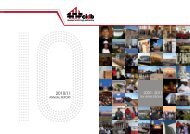
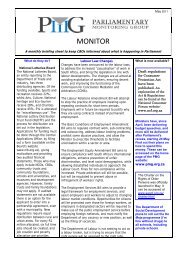
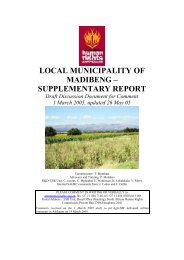
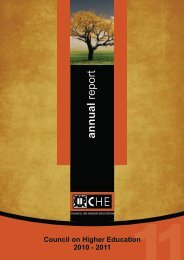
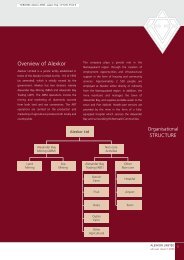
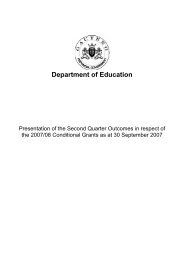
![National Research Foundation Annual Report 2008 / 2009 [Part 2]](https://img.yumpu.com/49774036/1/177x260/national-research-foundation-annual-report-2008-2009-part-2.jpg?quality=85)

